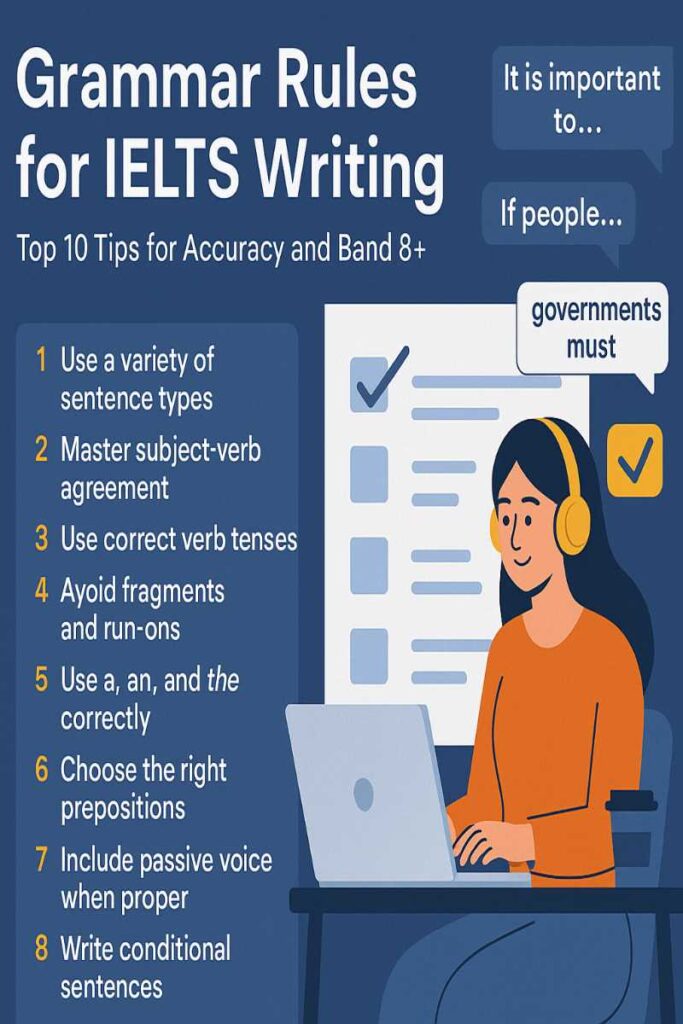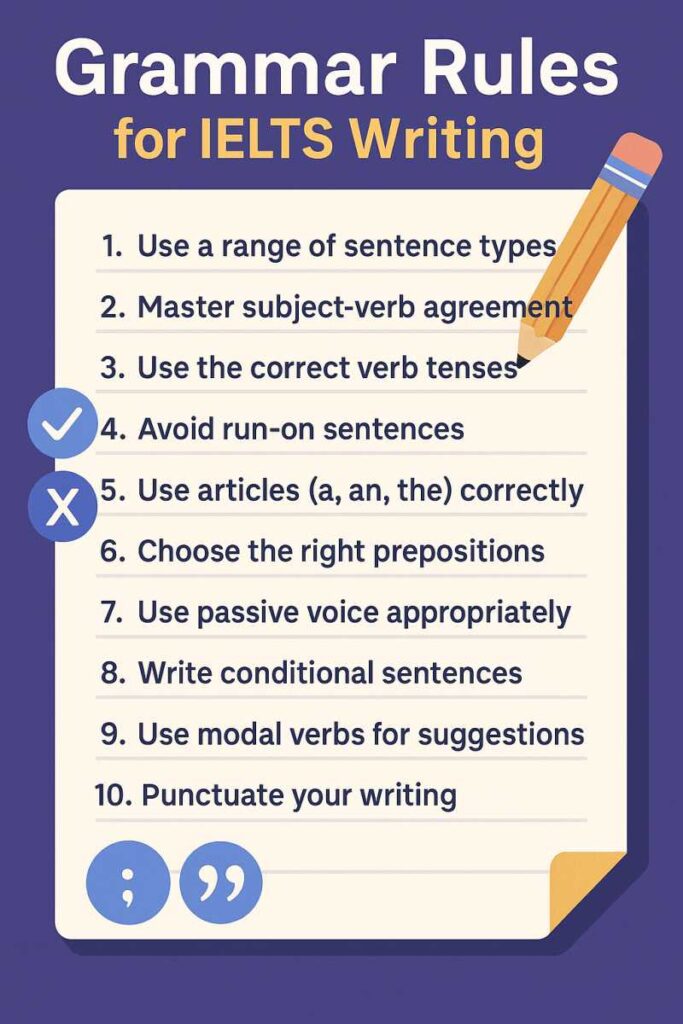Grammar Rules for IELTS Writing – Top 10 Tips for Accuracy and Band 8+
Grammar is a very important part of getting a good IELTS Writing Band Score. Even though having good ideas is important, what makes a Band 6 different from a Band 8 and above is how well they are presented with correct grammar and a range of ideas.

What this article gives you is:
You need to know these 10 language rules to do well on the IELTS
When to use correct language and how to fix it
Examples of how to use language at the Band 8 level
There are tools and methods you can use to make your work better
Now let’s begin.
What Grammar Does to Your IELTS Score
The IELTS Writing Band Descriptors list grammar as part of Grammatical Range and Accuracy. This part of the test is worth 25 percent of your writing score.
Someone checks to see if you can:
- Use different types of sentence patterns
- Use the right grammar and word order when you write
- Make fewer language mistakes, like subject-verb agreement or tense mistakes
How to Write Well on the IELTS: 10 Grammar Rules

1. Use a number of different sentence types
To get a Band 7 or higher, you need to:
- “Technology is changing our lives” is a simple sentence
- Compound sentence: “Technology changes our lives and how we talk to each other”
- Complex sentence: “Technology is changing our lives, but some people still like the old ways of talking to each other”
Tip: Use different sentence types to show that you can use different grammar rules.
2. Master agreement of subject and verb
Always check that the number of the subject and verb matches (singular or plural).
- Correct: “The government puts money into education”
- Incorrect: “The government put money into schools”
Tip: Be careful when using collective nouns like “family,” “team,” and “government” because they are usually written as singular in IELTS academic writing.
3. Use the right verb tenses
Based on time and reason, use the right tense:
- Simple present: “Pollution is bad for your health” is a general truth
- Past simple: “The law was passed in 1990”
- Present perfect: “Technology has changed the way we work”
Tip: Use only one tense in a sentence unless you need to change the time.
4. Don’t use run-on sentences or sentence fragments
Incorrect: “Because it’s simple to use social media” (not finished)
Correct: “People like social media because it’s easy to use”
Tip: Use commas and conjunctions to make the connections between your ideas clear.
5. Use articles like a, an, and the correctly
- Use “a” or “an” for singular countable words that are not specific: “A college degree is important”
- Use “the” to refer to a unique thing: “The university close to my house is highly ranked”
Tip: Don’t use articles in front of uncountable nouns like knowledge and education.
6. Pick the right prepositions
Prepositions are short but very important. For example:
- Pay attention: “Students should pay attention to their work”
- Worry: “A lot of people deal with stress”
- Depend on: “How well you prepare will determine the outcome”
Tip: Make flashcards or lists of prepositional phrases that are often used together.
7. Use passive voice when it makes sense
Passive voice works well in official academic writing.
- Active: “In 2005, people built the dam”
- Passive: “The dam was built in 2005”
Do not stress the subject; instead, stress the action.
Do not use passive voice too much; mix it with active voice to keep writing clear.
8. Use sentences with conditions
Conditions help show reasoning or possible ideas:
- First conditional: “Education will get better if the government spends more”
- Second conditional: “I would spend more on health care if I were in charge”
- Third conditional: “The crisis could have been avoided if they had acted sooner”
Helpful hint: These work well for opinion and solution essays.
9. Use modal verbs to make formal suggestions
Modals are used to show possibility, need, or advice:
- Might, Could: “The budget could be raised by the government”
- Should, Must: “We should tell students to read more”
- May, Might: “This could have effects that were not intended”
Tip: When making general comments, avoid casual modal verbs like “would.”
10. Use correct punctuation when you write
To keep things clear, use punctuation to separate ideas:
- Comma (,): To split clauses. “Education is very important to me”
- Semicolon (;): To connect two separate ideas. “The law was passed; it caused a lot of debate”
- Period (.): To end a complete thought
Do not use a comma to join two full sentences together.
Tip: Read your work out loud—pauses often show where punctuation is needed.
Example of Band 8-Level Grammar
Band 6: “People watch TV. It’s not good for you. They need to work out.”
Band 8+: “Watching TV can be relaxing, but too much time in front of a screen can be bad for your health. To stay balanced, people should do physical activity.”
Task 2 Grammar: IELTS Writing Task 2 Grammar Tips – Common Mistakes and How to Avoid Them
– Task 1 Samples: IELTS Writing Task 1 Academic – Sample Graphs, Vocabulary, and Tips
Grammar Mistakes That People Often Make When They Write for the IELTS
| Mistake | Fixing It |
| “I studied English last year.” | “I learnt English last year” |
| Article not found | “He’s a doctor” → “He works as a doctor” |
| Word order | “He runs very quickly” → “He moves very quickly” |
| Double subject | “My brother works as a teacher” → “My brother works as a teacher” |
| Mixing up “much” and “many” | “There are many people” → “There are lots of people” |
Tip: Look over your work after you’re done writing it and highlight the grammar rules you use too often.
Instructions for the Practice Exercise
Rewrite the line below to make it better in terms of grammar and structure:
Original: “It’s bad to pollute. People don’t care. The government needs to do something.”
Improved: “Pollution is a big problem that hurts the environment, but many people don’t care about it. To solve this problem, the government needs to take strong steps.”
Tools to Improve Your Grammar
| Tool | Use of the Tool |
| Grammarly | Checks your grammar and gives you tips on phrasing and clarity |
| Hemingway Editor | Helps with sentence order and readability |
| IELTS Writing Apps | Feedback tailored to the task |
| Quillbot | Rephrasing to change the meaning of a line |
| Grammar Workouts (British Council) | Quizzes and lessons to help you learn |
How to Get Better at Grammar for the IELTS Writing
- Every day, write a short article of 150 to 250 words
- Use feedback tools to look over and fix your own work
- Look at examples of Band 9 writings and mark the grammar rules
- Keep track of rules and changes in a grammar notebook
- For real examples, read academic pieces like news editorials and stories
Before you turn in your essay, use this grammar checker:
- Have you used at least three kinds of sentences
- Did you make sure the word tenses were correct
- Do you use the articles (a, an, the) correctly
- Do the quotation marks look right
- Did you change the spelling and length of your sentences
- Do you easily use prepositions
Thoughts for Now
Your IELTS Writing score can depend on how well you use grammar. You can have great ideas, but if you make a lot of mistakes, your band will not do well. The good news is that grammar gets better with regular use and feedback.
If you learn these 10 rules, you’ll quickly reach Band 8 and above English.
Call to Action
How do you most often mess up with this language rule when writing for the IELTS
Tell us what you think below, and we’ll help you get better
If you sign up, you’ll get weekly grammar quizzes, tasks for fixing mistakes in sentences, and sample essays

About the AuthorWelcome to TechIELTS. I’m Md. Jahangir Alam, an experienced engineer with over 15 years in electrical and automation systems. Alongside my engineering career, I’ve developed a strong interest in English language learning and IELTS preparation.
I hold a Duolingo English Test score of 135 (IELTS 7.5 equivalent) and am currently pursuing an M.Sc. in Cyber Security from Royal Holloway, University of London. I use my technical background to create clear, structured IELTS learning materials for students and professionals.
👉 Connect on LinkedIn
